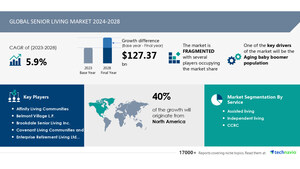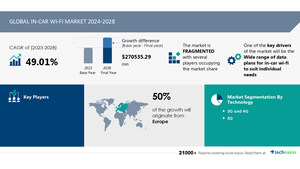NEW YORK, Nov. 27, 2024 /PRNewswire/ -- Report with the AI impact on market trends - The global high performance computing (HPC) market size is estimated to grow by USD 16.63 billion from 2023-2027, according to Technavio. The market is estimated to grow at a CAGR of 7.1% during the forecast period. Increasing utilization of big data analytics is driving market growth, with a trend towards growing use of cloud. However, high investments and costs associated with hpc systems poses a challenge.Key market players include Advanced Micro Devices Inc., Alphabet Inc., Amazon.com Inc., Atos SE, Cisco Systems Inc., Dassault Systemes SE, DataDirect Networks Inc., Fujitsu Ltd., Hewlett Packard Enterprise Co., Intel Corp., International Business Machines Corp., Landsea Group Co. Ltd., Lenovo Group Ltd., Microsoft Corp., NEC Corp., NetApp Inc., NVIDIA Corp., Oracle Corp., Super Micro Computer Inc., and Dell Technologies Inc..
Key insights into market evolution with AI-powered analysis. Explore trends, segmentation, and growth drivers- View Free Sample PDF
High Performance Computing (HPC) Market Scope |
|
Report Coverage |
Details |
Base year |
2022 |
Historic period |
2017 - 2021 |
Forecast period |
2023-2027 |
Growth momentum & CAGR |
Accelerate at a CAGR of 7.1% |
Market growth 2023-2027 |
USD 16.63 billion |
Market structure |
Fragmented |
YoY growth 2022-2023 (%) |
6.65 |
Regional analysis |
APAC, North America, Europe, South America, and Middle East and Africa |
Performing market contribution |
APAC at 46% |
Key countries |
US, China, Japan, Germany, and France |
Key companies profiled |
Advanced Micro Devices Inc., Alphabet Inc., Amazon.com Inc., Atos SE, Cisco Systems Inc., Dassault Systemes SE, DataDirect Networks Inc., Fujitsu Ltd., Hewlett Packard Enterprise Co., Intel Corp., International Business Machines Corp., Landsea Group Co. Ltd., Lenovo Group Ltd., Microsoft Corp., NEC Corp., NetApp Inc., NVIDIA Corp., Oracle Corp., Super Micro Computer Inc., and Dell Technologies Inc. |
MARKET DRIVER
High Performance Computing (HPC) is a key driver for economic growth in sectors like Media and Entertainment, Genomics Research, and Defense. Cloud-based HPC is a major trend, with companies like NEC Corporation and Microsoft offering solutions. In Media and Entertainment, HPC powers Next-Generation Sequencing and Computer-aided Engineering. Cyber security concerns are a priority, with Linux and Windows being popular choices. SambaNova, GPT Banking, and Hewlett Packard Enterprise are hardware providers leading the way. AI, Machine Learning, and optimization are common use cases. Cloud, AI systems, and Edge Computing capabilities are transforming industries like Finance, Bioscience, and Energy and Utilities. HPC software market is thriving, with HPC solutions catering to enterprise data needs. Companies like NVIDIA Corporation and Ampere Computing are investing in hardware and technologies. The Defense and Healthcare sectors are major consumers, with the Department of Energy and National Science Foundation leading HPC consortiums. Use cases include Physical simulation, optimization, Financial modeling, Life Science simulation, Autonomous vehicles, and Connected vehicles. Investment in exascale computing, supercomputing, and quantum technologies is on the rise. Software tools and computing architecture are crucial for on-premises, cloud, and hybrid deployment in large enterprises. Phones, IT services providers, and Cray EX supercomputers are also part of the HPC ecosystem. The Digital India Program and Frontier supercomputer are significant initiatives. Use cases continue to expand, with AI supercomputers and supercomputing playing a crucial role in various industries.
The global High Performance Computing (HPC) market has witnessed consistent growth in the adoption of cloud-based solutions. Cloud HPC enables organizations to utilize computing resources on-demand, obviating the need for substantial investment in hardware and software infrastructure. Major cloud service providers, such as Amazon Web Services (AWS), Microsoft Azure, and Google Cloud Platform, offer a variety of HPC services, including high-performance virtual machines and storage solutions. This trend is driven by the expanding availability and affordability of cloud computing services from these leading providers.
Request Sample of our comprehensive report now to stay ahead in the AI-driven market evolution!
Market Challenges
- High Performance Computing (HPC) is a vital technology driving economic growth in various sectors, including media and entertainment, genomic research, and defense. The HPC market faces challenges such as the shift to cloud-based solutions, cyber security concerns, and the need for next-generation technologies like Artificial Intelligence (AI) and Machine Learning (ML). NEC Corporation, Microsoft, Hewlett Packard Enterprise, and others are leading hardware providers addressing these challenges. Cloud-based HPC is gaining popularity in media and entertainment for rendering complex visual effects. Genomics research relies on HPC for Next-Generation Sequencing and bioinformatics analysis. Cyber security is a concern, especially with the increasing use of Linux and Windows systems, SambaNova, and other HPC software. HPC solutions are essential for industries like banking, finance, and energy, with use cases including financial modeling, optimization, and physical simulation. AI systems like Apollo HPE systems and Cray EX supercomputers are transforming sectors like robotics in healthcare, autonomous vehicles, and connected vehicles. The HPC software market is growing, with software tools for optimization, machine learning, and AI. HPC consortiums like the National Science Foundation and the Department of Energy are investing in exascale-ready systems and supercomputing. Challenges include data breaching risks, data center CPUs from companies like NVIDIA Corporation and Ampere Computing, and the need for exascale computing. The HPC market is also seeing innovation in quantum technologies, bio molecular medicines, and European production facilities. Use cases for HPC include optimization, machine learning, financial modeling, life science simulation, and physical simulation. HPC solutions are deployed on-premises, in the cloud, or in hybrid configurations for large enterprises. The Digital India Program and the Frontier supercomputer are examples of HPC initiatives. The computational demand for HPC is increasing, making it an exciting area for investment and innovation.
- The global High Performance Computing (HPC) market faces significant challenges due to high upfront investments and escalating operational costs. For instance, an IBM Watson supercomputer costs approximately USD3 million, while Fujitsu's K Computer for the Riken Advanced Institute of Computational Science in Kobe, Japan, required over USD1.2 billion to build and USD10 million annually for maintenance. Energy consumption is another major concern, with HPC systems using around 6-7 megawatts on average and peaking at over 9 megawatts. These factors limit the adoption of HPC systems in various industries.
Discover how AI is revolutionizing market trends- Get your access now!
Segment Overview
This high performance computing (hpc) market report extensively covers market segmentation by
- Component
- 1.1 Server
- 1.2 Storage
- 1.3 Application
- 1.4 Services
- 1.5 Middleware
- Deployment
- 2.1 On-premise
- 2.2 Cloud
- Geography
- 3.1 APAC
- 3.2 North America
- 3.3 Europe
- 3.4 South America
- 3.5 Middle East and Africa
1.1 Server- The High Performance Computing (HPC) server market is experiencing significant growth, primarily driven by the expanding supercomputer industry. Supercomputers are increasingly being adopted by various sectors, including oil and gas, energy, manufacturing, research institutions, and R&D centers, due to the increasing demand for advanced computing capabilities. Supercomputers are used to solve complex applications, such as molecular scanning, aircraft design, financial analysis, automotive testing, seismic and genomic analysis, and product development workflows. The global supercomputer market's growth is attributed to the rising adoption of pre-configured clusters and the increasing interest in cluster computing. Divisional servers are also gaining popularity due to their cost-effective features, such as lower initial costs and fast processing speeds, making them an attractive option for divisions within firms. The growing demand for HPC servers in these applications is expected to drive the growth of the global HPC market during the forecast period. Nations worldwide are also increasing their investments in high-performance computing to drive scientific advances, industrial innovation, and economic competitiveness. The increasing spending on supercomputing is further expected to fuel market growth.
Download a Sample of our comprehensive report today to discover how AI-driven innovations are reshaping competitive dynamics
Research Analysis
High Performance Computing (HPC) market is witnessing significant growth due to the increasing demand for computational power in various industries. Cloud-based HPC is a key trend, enabling organizations to access HPC resources on-demand and reduce costs. Media and entertainment industry is a major consumer of HPC, using it for rendering high-definition visual effects and creating realistic animations. HPC is also crucial in genomic research, where Next-Generation Sequencing generates vast amounts of data requiring advanced processing capabilities. Cyber security concerns are driving the need for HPC solutions to protect sensitive data. Linux and Windows are popular operating systems in HPC, with Linux dominating due to its open-source nature and flexibility. New players like SambaNova are disrupting the market with their innovative hardware and software solutions. Economic growth in emerging economies, particularly in the Digital India Program, is fueling the demand for HPC. Use cases include Artificial Intelligence, Electronic Design Automation, Computer-aided Engineering, and supercomputing. Exascale computing and the development of the Frontier supercomputer are the future of HPC, offering unprecedented processing power and computational capabilities. The HPC consortium is a collaborative effort to advance HPC technologies and applications.
High Performance Computing (HPC) is a critical technology driving innovation and economic growth in various sectors, including media and entertainment, genomic research, and defense. Cloud-based HPC is gaining popularity due to its flexibility and cost-effectiveness. Next-Generation Sequencing in bioscience and Bio molecular medicines require massive computational power for data analysis. HPC solutions are essential for sectors like Computer-aided Engineering, robotics in healthcare, physical simulation, optimization, machine learning, financial modeling, life science simulation, autonomous vehicles, and connected vehicles. HPC hardware providers like NEC Corporation, SambaNova, GPT Banking, and Microsoft offer advanced technologies to meet the increasing demand. Cybersecurity concerns are a significant challenge, making HPC software market and solutions crucial for enterprise data protection. HPC use cases include AI, quantum technologies, and supercomputing applications in defense, healthcare, energy and utilities, transportation, education, and more. HPC consortiums, such as the National Science Foundation, collaborate to develop exascale-ready systems, including the Frontier supercomputer, and invest in software tools and computing architecture. Cloud deployment, on-premises deployment, and hybrid deployment are popular HPC deployment options. Companies like NVIDIA Corporation, Hewlett Packard Enterprise, Ampere Computing, and Leibniz Supercomputing Centre provide exascale-ready systems, supercomputers, and AI systems, while phoenix NAP acts as an IT services provider. HPC technologies like Linux, Windows, and SambaNova play a crucial role in HPC infrastructure. The Digital India Program aims to deploy an artificial intelligence supercomputer to drive digital transformation. The computational demand for HPC applications continues to grow, with exascale computing being the next frontier.
1 Executive Summary
2 Market Landscape
3 Market Sizing
4 Historic Market Size
5 Five Forces Analysis
6 Market Segmentation
- Component
- Server
- Storage
- Application
- Services
- Middleware
- Deployment
- On-premise
- Cloud
- Geography
- APAC
- North America
- Europe
- South America
- Middle East And Africa
7 Customer Landscape
8 Geographic Landscape
9 Drivers, Challenges, and Trends
10 Company Landscape
11 Company Analysis
12 Appendix
About Technavio
Technavio is a leading global technology research and advisory company. Their research and analysis focuses on emerging market trends and provides actionable insights to help businesses identify market opportunities and develop effective strategies to optimize their market positions.
With over 500 specialized analysts, Technavio's report library consists of more than 17,000 reports and counting, covering 800 technologies, spanning across 50 countries. Their client base consists of enterprises of all sizes, including more than 100 Fortune 500 companies. This growing client base relies on Technavio's comprehensive coverage, extensive research, and actionable market insights to identify opportunities in existing and potential markets and assess their competitive positions within changing market scenarios.
Contacts
Technavio Research
Jesse Maida
Media & Marketing Executive
US: +1 844 364 1100
UK: +44 203 893 3200
Email: [email protected]
Website: www.technavio.com/
SOURCE Technavio

WANT YOUR COMPANY'S NEWS FEATURED ON PRNEWSWIRE.COM?
Newsrooms &
Influencers
Digital Media
Outlets
Journalists
Opted In




Share this article